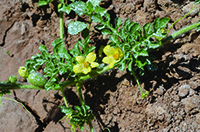

|

|
|
2012 Highlights: UC IPM Annual Report Kaolin clay-covered melon plant. Photo by V. Barlow. Kaolin clay-covered melon plant. Photo by V. Barlow.Kaolin clay doesn?t harm honey bees or natural enemies in watermelonsIN BRIEF
Vonny Barlow, an entomology advisor for UC Cooperative Extension in Riverside County who is affiliated with UC IPM, is looking for more options to manage whiteflies on watermelon crops. These whiteflies can carry the virus that causes cucurbit yellow stunting disorder and spread it to watermelon plants. The current practice is to apply insecticides, but few are available and the virus is still a problem even after treatment. Barlow tested kaolin clay, which, when sprayed on plants, creates a physical barrier to prevent insect feeding. Because kaolin clay covers the plant and flower surface, research is needed to determine whether its application prevents honey bees from visiting and pollinating melon flowers and whether kaolin clay will harm the natural enemies that reduce whitefly numbers. Early results show that honey bee activity, determined by the number of floral visits, was similar in untreated plants and that natural enemies don’t appear to be affected. While looking for new ways to manage pests and develop IPM programs in watermelon and other crops, Barlow is researching alternative pesticides and determining ways to conserve natural enemies. In doing so, he also hopes to prevent harm to honey bees, whose pollination of agricultural crops is worth $15 billion. > Next article: Non-native bugs invade California |